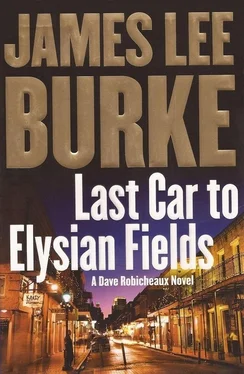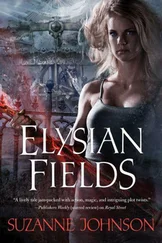I knew it was sunlight when I awoke. I could feel its warmth on my skin, see its red-edged radiance at the corners of the tape that covered my eyes. Along with the chemical odor, perhaps ether or chloroform, that still clung to my face I could smell dead fish and ponded water that had gone stagnant inside shade and blackened leaves freshly broken by someone’s shoes. I was seated in a chair, my wrists cuffed behind me with a plastic band. I turned my head into a breeze blowing from a window or door, like a blind man entering his first day without sight, vainly hoping the world around him was not filled with adversaries.
A motorboat passed a short distance away. When the sound of the wake sliding through flooded trees died, I heard two men talking about a football game in another room. I tried to rise from the chair, then realized both my ankles were strapped to the legs. “Asshole is awake,” I heard one of the men say.
A door opened and I felt the planks under my feet become depressed by the weight of the men entering the room. “How you feel?” one of them said.
“You’re kidnapping a police officer,” I said.
“I asked you how you felt.”
“All right. I feel all right,” I replied.
“Hear that? He’s all right,” the second man said. “Frank Dellacroce is not all right. Somebody blew most of his head off.”
“It wasn’t me,” I said.
“It wasn’t him,” the second man said. “That’s good to hear, ‘cause people say you kicked the shit out of him the night he was killed. While he was in handcuffs.”
“You got it wrong,” I replied.
“He says we got it wrong. That’s good, ‘cause what we hear about you ain’t so good. We hear you got a hard-on ‘cause you can’t drink, that you like to beat up people, that you got some kind of problem with Italians in general,” the same voice said.
“I haven’t seen you. I don’t know who you are. I think what we have here is a misunderstanding. I’m ready to let it go at that,” I said.
“He’s ready to let it go. I like that. We’re talking about a generous man here,” the same voice said. “You want a beer?”
“No.”
“Yeah, you do.”
I turned my face toward the voice. “Why pull a federal beef down on yourselves? Use your head,” I said.
“Oh, we’ll use our head, all right. You bet your life,” the same man said.
I heard a tab being torn loose from a pressurized can, then smelled beer and heard foam splattering on the floor. I could hear someone drinking from the can, swallowing thirstily. He pressed the can against my mouth, clicking it against my teeth, then forcing the aluminum rim between my lips.
“Don’t do that,” the first voice said.
“He wants it. He just don’t know it yet,” the second man said.
Someone, I think the second man, pulled loose my belt, then inserted his fingers between my trousers and stomach and poured the remnants of the can into my underwear. “You already pissed your pants while you were asleep, so I’m just cleaning you up,” he said.
I felt the beer run down my thighs and calves. The wind blew through the windows and puffed the room and tin roof with air that smelled of brine and ozone and thunderheads out on the Gulf. Try to think clearly, I told myself. If they simply wanted to kill you, you would already be dead. They’re not using their first names with one another and your eyes are taped because eventually they’re going to release you. Don’t change their agenda, I thought.
“Where’s this guy Max Coll?” the first man said.
“If you find out, I’d like to know. He creeped my house,” I replied.
“He creeped a cop’s house?” the same man said.
“He’s not your ordinary button man,” I said.
“What’s he look like?”
“I never saw him,” I lied.
“He’s a Mick, though, right?” the same voice said.
“We know he’s in the area. We think he popped Frank Dellacroce. But we don’t have much information on him.”
Suddenly a steel instrument bit into my left thumb and mashed the tissue and veins into the joint. I tried to clench my jaws on the scream that came out of my throat.
“That’s what happens when you try to jerk us around,” the second man said. He was behind me now, his breath touching the back of my ear.
“Guess where these pliers are going next?”
“No more of that,” the first man said.
“He killed Frank,” the second man said.
“Maybe. But we wait on the man and see what he wants. Get out of the way,” the first voice said.
I smelled his presence in front of me, like hair with sweat dried in it and clothes with soap still in the fabric. Then his huge hand molded a chemical-soaked towel over my face and I felt myself floating to the bottom of a dark well where laughing faces stared down at me from a circle of blue overhead.
I lay sideways on a floor through most of the afternoon, my eyes still taped, my knees and ankles now wrapped tightly with tape as well. In my mind’s eye I tried to see the faces of all the people who had been important in my life. I thought of my mother and father, illiterate Cajuns who had done the best they could with what little they owned and who struggled through the Depression and the war years to create a decent home for themselves and their only son. I thought of the two Catholic nuns who had been my first- and second-grade teachers and the time when I accidently walked into a room where they were jitter-bugging to a phonograph, their beads and habits flying. The other clergy I had known in my early years had disappeared from memory, but those two remained with me, as though framed inside a secular holy card.
I thought about the members of my platoon, deep in Indian country, blade faced, stinking of funk and rotted socks and mosquito repellant their skin twitching as they worked their way down a night trail strung with toe-poppers and booby-trapped 105 duds. I thought about my dead wives, Annie and Bootsie, who were always my steadfast friends as well as spouse and lover, and I thought about Alafair, my adopted daughter, studying at Reed College in Portland, and wondered if I would ever see her again.
I thought about the country in which I had grown up and which I had served as a soldier and police officer. It was the best country on earth, the most noble, egalitarian, democratic experiment in human history. It was a grand and wonderful place to live, well worth the fighting for, as Ernest Hemingway would. say. Thomas Jefferson knew that, and so did Woody Guthrie, Dorothy Day, Joe Hill, Molly Brown, and the IWW.
To hell with the likes of my warders, who I was sure were Tito and Caesar Dellacroce. Let them do their worst, I told myself. And to hell with all the politicians on the take and the princes of industry who lionized Third World bedbugs in order to carry out their agenda of inculcating fear in the electorate at home. America was still America, the country everyone in the world wanted to emulate, where rock ‘n’ roll and the Beat lyrics of Jack Kerouac would outlive all the venal interests that threatened her.
Dying wasn’t so bad, not if you faced it bravely, with a clear conscience and your principles still intact. But maybe it wouldn’t come to that, I told myself. The tape was still on my eyes, my tormentors ostensibly still unidentifiable.
At least that is what I told myself.
Then I heard movement in a room beyond the door of the room in which I lay, and the muffled voices of at least three men talking, and I felt my sense of personal resolve begin to drain like water from the bottom of a gunnysack.
The door opened and two sets of hands lifted me into a chair. The room was silent, the tin roof creaking from the cooling of the day. Someone wrapped tape both around my waist and the back of the chair.
Читать дальше












